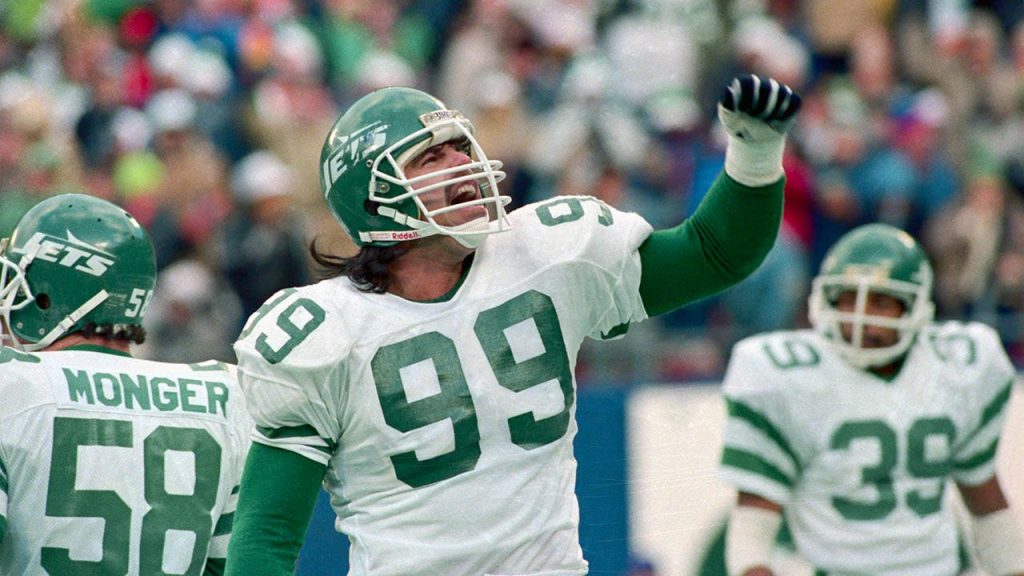The Lingering Sting of a Controversial Sack: Mark Gastineau’s Unresolved Grievance Against Brett Favre
The world of professional sports is replete with records, milestones, and moments of glory that etch themselves into the annals of history. However, alongside these triumphs, there exist controversies and disputes that cast long shadows, leaving a bitter taste in the mouths of those who feel wronged. One such enduring controversy revolves around the single-season sack record in the NFL, a record once held by Mark Gastineau, a flamboyant and dominant defensive end for the New York Jets. In 1984, Gastineau achieved the seemingly insurmountable feat of recording 22 sacks, a record that stood as a testament to his prowess and tenacity. Yet, this record, once a source of pride and accomplishment, became a source of contention and resentment when Michael Strahan, a formidable defensive end for the New York Giants, seemingly eclipsed it in 2001 under circumstances that Gastineau and many others deem dubious.
The controversial play that propelled Strahan past Gastineau occurred in the waning moments of a game between the Green Bay Packers, led by quarterback Brett Favre, and the New York Giants. With the Packers leading 34-25 and less than three minutes remaining, Favre executed a seemingly innocuous play-action fake, rolling to his right. Strahan, positioned strategically, met Favre and brought him down for what was officially recorded as a sack, giving him 22.5 for the season and surpassing Gastineau’s long-standing record. However, the manner in which Favre fell to the ground, seemingly without much resistance, sparked immediate suspicion and accusations of collusion. Critics argued that Favre deliberately allowed himself to be sacked to gift Strahan the record, a claim that has never been definitively proven but continues to fuel debate and speculation.
The ensuing controversy surrounding the record-breaking sack has remained a festering wound for Gastineau, who steadfastly refuses to acknowledge Strahan’s achievement as legitimate. Gastineau’s resentment is not solely directed at Strahan but also at Favre, whom he believes actively participated in the alleged scheme to usurp his record. This festering animosity was recently brought to light in an ESPN 30 for 30 documentary, which captured a tense and uncomfortable encounter between Gastineau and Favre.
In the documentary, Gastineau confronts Favre, accusing him of deliberately "taking a dive" to allow Strahan to break the record. The exchange is charged with emotion, with Gastineau expressing his deep-seated hurt and frustration while Favre attempts to deflect the accusations, offering a handshake that Gastineau pointedly ignores. The scene underscores the lingering pain and unresolved nature of the controversy, which continues to haunt Gastineau and cast a shadow over Strahan’s achievement.
The documentary provides a glimpse into the psychological toll the incident has taken on Gastineau, who clearly feels robbed of a significant accomplishment. His words, "You hurt me, Brett. You hurt me," resonate with the raw emotion of someone who believes they have been unjustly treated. Gastineau’s unwavering conviction that Favre colluded with Strahan underscores the deeply personal nature of the controversy. For Gastineau, the record is not merely a statistical achievement but a symbol of his hard work, dedication, and dominance. To have it seemingly taken away under questionable circumstances adds insult to injury.
The controversy surrounding Strahan’s record also raises broader questions about the nature of sports records and the importance of integrity and fair play. While records are meant to celebrate exceptional athletic achievements, they lose their meaning and significance if they are tainted by suspicion of manipulation or collusion. The debate over Strahan’s sack highlights the delicate balance between celebrating individual accomplishments and upholding the principles of fair competition.
While Strahan’s record has since been tied by T.J. Watt and surpassed, the controversy surrounding its initial attainment continues to linger. The incident serves as a reminder that even in the realm of sports, where objective measures like statistics seemingly provide definitive answers, subjective interpretations and accusations of impropriety can cast a long shadow over even the most celebrated accomplishments. The unresolved dispute between Gastineau and Favre, captured vividly in the ESPN 30 for 30 documentary, serves as a testament to the enduring power of grievances and the lasting impact of perceived injustices in the competitive world of professional sports.










